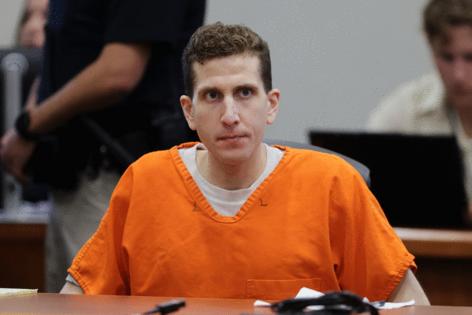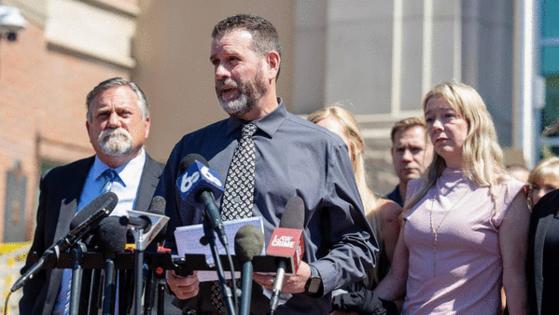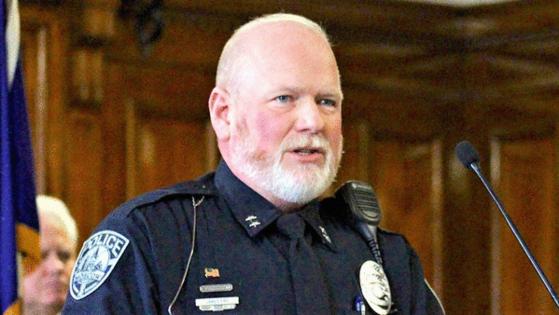Former Moscow police chief reflects on Kohberger and Idaho student murder case
Published in News & Features
BOISE, Idaho — James Fry, former chief of the Moscow Police Department, never entered the crime scene.
With previous experience as an investigator, the veteran officer of decades knew it could compromise evidence at the home where four University of Idaho students were killed in November 2022. Fry was determined, he said, to do everything in his power to ensure police found the person responsible.
As the father of four children — three daughters and one son — about the same age as the murder victims, their deaths immediately hit close to home, Fry told The Idaho Statesman in an interview.
“It’s an interesting dynamic, because you can’t just put it aside that, ‘Oh, it was somebody else’s kids,’ ” he said. “You realize that could have been me, it could have been my kids.”
After eight years as chief and nearly 29 years overall with the city police department, Fry retired from his post in May 2024. His decision came about a year and a half after the arrest of Bryan Kohberger, who stabbed the four college students to death for reasons detectives said they still don’t know.
The victims were U of I seniors Madison Mogen and Kaylee Goncalves, both 21, junior Xana Kernodle, 20, and freshman Ethan Chapin, 20. The three women lived with two other female roommates at an off-campus home on King Road in Moscow, and Chapin slept over for the night with Kernodle, his girlfriend.
The four victims each died of several stab wounds in the overnight attack. Goncalves and Kernodle were found with dozens of lacerations each, according to newly released police reports.
Fry, 56, who recently signed on as police chief in West Richland, Washington, was inside the Boise courtroom where Kohberger was sentenced to life in prison. The 30-year-old former Washington State University Ph.D. student of criminology pleaded guilty to the murders earlier this month. Fry attended previous court hearings in Moscow before the high-profile case moved 300 miles south to Boise, but never before did he see the defendant face to face, he said.
“That was the first time I actually saw him, which was interesting,” Fry said. “The most non-emotional person I’ve ever seen. Just cold. Nothing.”
During the two-hour hearing, the victims’ family members and the two surviving roommates verbally confronted Kohberger for the first time in court. He responded by uttering just three words at his chance to speak: “I respectfully decline.”
Fry said the experience brought back a range of emotions.
“It’s heartbreaking,” he said, tearing up with an Idaho Statesman reporter. “Especially as cops, you’re not supposed to show emotion, you’re not supposed to cry. But if you don’t show emotion on something like this, I think there’s something wrong with you.”
But after nearly three years — the most drawn-out case of his law enforcement career — it finally was put to rest. Judge Steven Hippler, showing his own signs of emotion at the hearing, sentenced Kohberger to four consecutive fixed-life terms with no chance of parole, and no ability to appeal, per his plea deal with prosecutors.
“Lives have been changed, lives have been destroyed,” Fry said. “Communities changed, law enforcement officers changed. It affects every aspect of society. … I hope that the families can heal and move on as much as you can.”
Allowing Kohberger to avoid trial and the possibility of the death penalty through a plea agreement remains a point of contention, including for members of at least two of the victims’ families. Even President Donald Trump waded into the issue before Kohberger’s sentencing.
Fry said he accepted Latah County Prosecutor Bill Thompson’s decision to make the deal.
“I understand both sides,” he said. “What is important is we have a person in prison for the rest of his life, and (he) can never hurt people again. So I have to prioritize things, and he didn’t get the death penalty, but he’s going to die there.”
Out of town in Central Washington when he got the call on a Sunday afternoon in mid-November about the fatal stabbings, Fry raced back to Moscow with his wife. He first stopped at home to change and grab his duty weapon, he said, before getting over to the home on King Road, which quickly generated criticism.
“Doesn’t it make sense that I’d go get my gun if I’m going to a scene where there’s a homicide?” Fry said, referencing his first instinct of a cop. “I’m like, ‘OK whatever, I’ll take that beating.’ ”
He assigned Moscow Police Cpl. Brett Payne to lead the investigation, and also made the decision to call in the help of the Idaho State Police and the FBI. Working together, the team got to work.
Payne, during his review of the scene, found a leather knife sheath next to Mogen’s body in her room on the third floor of the home. Next to her, Goncalves also had been killed and injured to the extent that she was left “unrecognizable,” one police report read.
The key to the investigation had been located, however. On the button snap of the knife sheath for a long, fixed-blade knife, a single source of male DNA was discovered and processed at the Idaho State Police crime lab. It was later matched directly to Kohberger.
Through surveillance footage in the neighborhood and around Moscow and Pullman, where Kohberger lived at the time, investigators eventually settled on what was Kohberger’s car, a 2015 white Hyundai Elantra. And through search warrants, cell tower pings helped police understand the suspect’s movements in the hours before and after the homicides.
Payne told reporters that even without the DNA from the knife sheath, he was confident the growing evidence would have eventually led police to Kohberger. Investigators had the same conversation “ad nauseam,” he said.
“The answer is yes, through the car most likely,” Payne said. “We would have found him. We would.”
Fry agreed, also citing the cellphone data, though acknowledged it could have pushed the arrest out by an unknown amount of time, perhaps by months.
“I still think we would have got him,” he said. “Though you put a timeline on it, who knows what that timeline looks like, right? … You don’t know. But I can tell you that we were scouring everything we could scour, and looking for everything we could look for. So I do believe, but I’m sure thankful we got the knife sheath.”
Fry declined to detail other still unreleased pieces of evidence, which remain under seal in court records, that he said would have contributed to proving Kohberger’s guilt at trial. But he expected that would become public in the future.
With the FBI’s help, arriving at Kohberger five weeks later as the suspect was “surreal,” Fry recalled. They made the arrest in Pennsylvania two weeks later in December 2022.
It was “shocking” and upsetting, he said, when he learned of Kohberger’s background in criminology and study of police investigations. It’s impossible to say whether Kohberger pursued an education in these areas to one day commit murder, Fry said.
“I think he liked the forensic world, I think he liked the crime scene portion of it,” he said. “Kind of a twisted mind, if so, but we know that people plan, people utilize their skill set and what they learn to benefit whatever they’re going to do. … I can’t say that’s why he was in that program, but it makes you speculate, doesn’t it?”
Many other unanswered questions in the case — most notably Kohberger’s motive — remain for police and the public, Fry said, which he understands can feel frustrating. But that’s common in investigations of this nature, he said.
“Unfortunately, I think we have to come to the end that we may never have some of those,” he said. “When you go to these, your job is to collect evidence that ties that person to that location. You may not get all the answers.”
Police work requires that detectives move beyond the issue, Fry said. He hopes others, to include the four victims’ family members who continue to hang onto the primary question of why, will one day reach acceptance of it, too.
“We get caught up in that investigators are going to give you every answer to every question, and that’s not reality,” he said. “There’s only one person that knows every answer. He might be looking back now going, ‘What the heck was I thinking?’ I don’t know. I don’t know.”
________
©2025 Idaho Statesman. Visit at idahostatesman.com. Distributed by Tribune Content Agency, LLC.












Comments